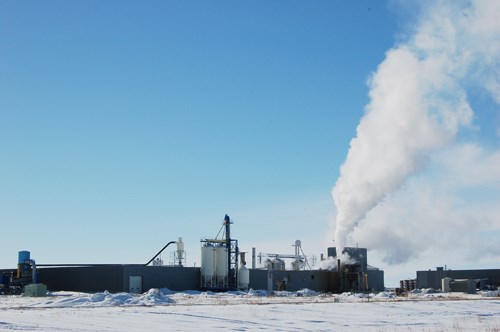Environment Minister and Weyburn-Big Muddy MLA Dustin Duncan wants to assure Weyburn residents that the smoke and odour coming from the NorAmera BioEnergy ethanol plant is not hazardous and that plans are in place to reduce the smell.
Duncan met with members of the local media on February 18 to try to alleviate concerns from residents about air quality. He said that the ethanol plant is operating in compliance with provincial air quality standards and is taking steps to reduce odours from the plant.
"I understand the concern people have, not only as Minister of the Environment and MLA, but as a resident of Weyburn," said Duncan. "And I think people need to be reassured...our number one concern is safety."
Duncan said that the Ministry of Environment performed four air quality monitoring sessions in Weyburn over a week-and-a-half period in November and December. Technicians tested the air quality in seven locations throughout the city.
"From air quality standards there really are no issues," said Duncan. "The ethanol plant has to abide by our regulations and they are within compliance."
Duncan said that ethanol plant odour is not just a Weyburn issue, but an issue in all communities residing near an ethanol plant. One way that the Weyburn plant is attempting to deal with this issue is by installing a new drying system that will heat material at a slower rate.
The new dryer has arrived at the plant and is expected to be operational over the next few weeks.
Rob Davies, president of NorAmera BioEnergy and CEO of Weyburn Inland Terminal (controlling owner of NorAmera), said that the new dryer, purchased by the company last summer, should dramatically reduce the plant's odour and smoke problem.
Davies said that smoke and odour is just a by-product of drying animal feed, a necessary component of producing ethanol. The feed, usually wheat or corn, is heated during the drying process, which takes place after a series of many steps, including mashing, fermentation and distillation.
Davies said the strength of the odour changes from day-to-day because of several variables, including the type of animal feed being processed, dryer temperature, and wind direction.
"This is a complex engineering problem that we are working through," said Davies. "Certainly there are some days, especially last fall, when it was smokier than we would like it to be but we are taking steps to reduce that."
The plant has already attempted to address odour issues by raising their smoke stacks. They will look at raising the stacks again if the new dryer does not reduce odour.
Duncan said that the plant is attempting to deal with the odour concerns because they want to be seen as a positive contributor to the community. One way the plant contributes is by providing approximately 25 jobs in the community. They also provide producers with another local market for their grains, according to Duncan.
Duncan also praised the work of the ethanol plant on a broader scale.
"The ethanol industry as a whole has a lot of benefits. Just using ethanol in our gasoline means we need less oil and less fossil fuel is used to produce gasoline. Right now we're at about a 10 percent blend in the province."
Duncan said that hopefully residents will begin to notice a difference in the frequency and severity of odour from the plant this spring. Once the dryer is in operation, the plant will hire a consultant to test the air quality once again.




